Naturally, any after-school program director or coordinator would like their program to have engaged and motivated students whose academic performance and social skills are improving within a safe and supervised environment.
However, you also know that managing a high-quality program with such results has many moving parts, such as strengthening relationships with students and your community, keeping in touch with parents, and coordinating program staff.
Given this complexity and today’s technological advances, certain best practices have emerged that can help you streamline and improve different aspects of after-school program management, thus increasing the quality of your entire program.
Without further ado, here are the top five best practices for running a successful after-school program.
- Know How to Lead
- Build Connections in Your Community
- Strengthen Your Relationship With Students
- Keep in Touch With Parents
- Run Your Program With the Right Software
- Conclusion
Know How to Lead
We could say that behind every successful after-school program is an equally skillful program director who knows how to lead.
This means program directors should have an open leadership style that contributes to a positive after-school program environment based on supportive relationships between staff members and students.
For instance, an after-school program leader can hold regular team meetings where staff members are encouraged to share their ideas and concerns and give and receive constructive feedback.
The same applies to giving students opportunities to have their say and provide feedback about the program.
For this purpose, the program leader can organize student meetings, create a suggestion box, or conduct an online survey for students and parents, like in this example:
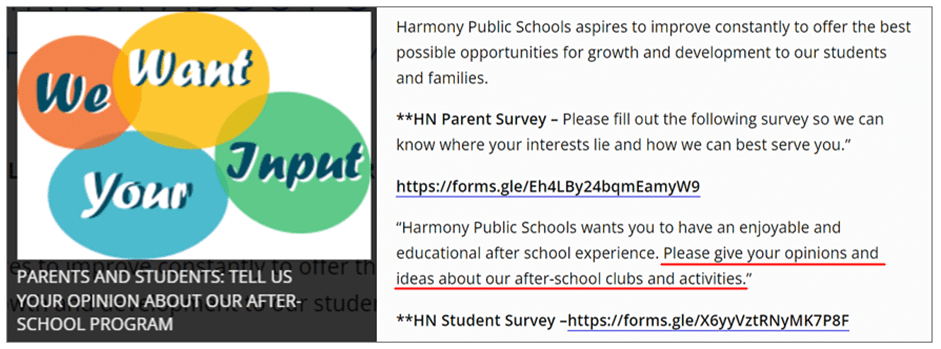
Source: HST Houston
Of course, a good leader will transparently communicate expectations from staff and students, ask for feedback, and generally create a sense of trust.
Another aspect of quality program leadership is being able to clearly articulate the program’s mission, goals, and benefits to everyone involved—staff, students, families, and community leaders—in order to generate the support crucial for the program’s success.
Here’s an example of how the Ventura Unified School District and the City of Ventura clearly communicate these program elements.
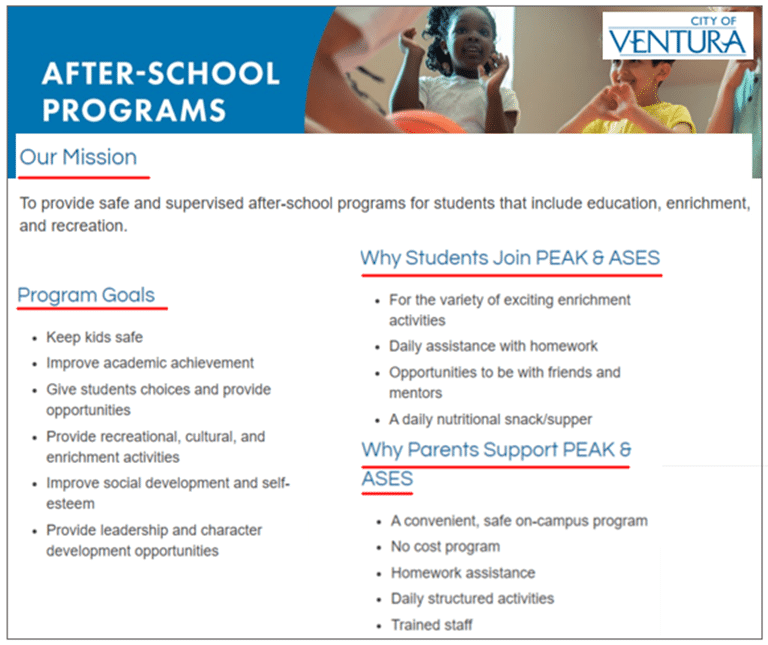
Source: City of Ventura
Considering that after-school programs generally provide a variety of activities, their success depends on the participation and collaboration of various educators, counselors, tutors, activity leaders, program assistants, coaches, volunteers, and parent helpers.
And the program director manages and coordinates all of them, so their leadership is crucial for running a successful after-school program.
So, to recap what a great program leader should do:
- define a clear vision for the program and communicate it to all stakeholders
- lead by example
- actively listen to staff and student feedback
- encourage staff and students to take initiative
- foster a positive environment
When these leadership skills are coupled with good management practices, such as hiring qualified staff and encouraging students’ regular attendance, studies show that students develop better work habits and achieve higher test scores.
Therefore, the most important practice is developing a combination of skills that will help you lead, motivate, and inspire everybody whose support you need to run a successful after-school program.
Build Connections in Your Community
Whether an after-school program is successful or not largely depends on the program director’s ability to build connections with groups, organizations, businesses, and individuals in their community.
If you can leverage those connections, your community can help with resources such as financial assistance, materials, supplies, and services your program needs to provide students with better learning experiences after their regular school day.
For example, arts, science, and technology activities are often enhanced by using materials, supplies, or equipment donated by local organizations and businesses.
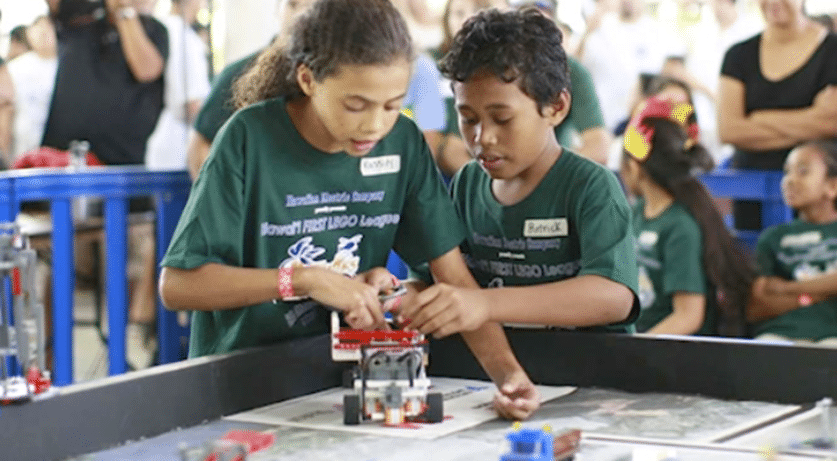
Source: MiddleWeb
Moreover, various community groups and individuals possess the knowledge, experience, and skills to improve workshops and events aligned with your program’s goals and students’ interests.
Such activities will provide students with engaging learning experiences that can help them both academically and socially.
The same effect is generated when community members work with students individually, usually as tutors and mentors.
For instance, local high school or university students can volunteer their time to provide homework assistance and tutoring during the after-school program, like in this example:
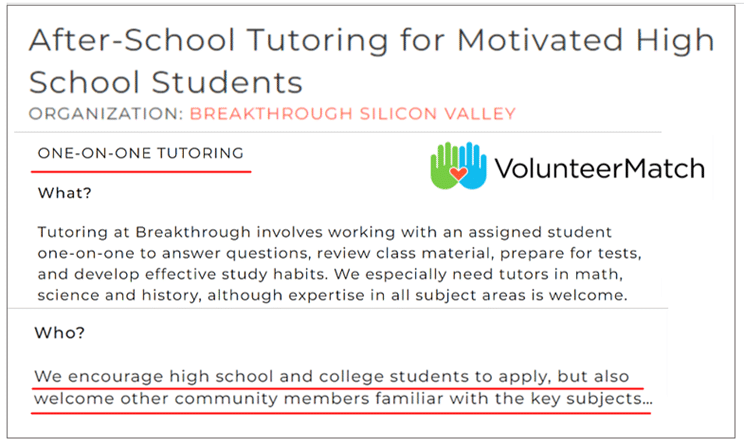
Source: Volunteer Match
Furthermore, community members may be invited as guest speakers to share their knowledge and expertise in a particular field or topic.
Likewise, you can organize after-school field trips to local public institutions, such as museums, libraries, and universities, to provide students with real-life learning experiences.
Maybe most importantly, strong relationships with your community allow you to incorporate community service opportunities into your program, thus providing students with a valuable opportunity to give back to their community.
Such opportunities are an excellent way for students to become more involved in their community while enhancing their personal, social, and academic growth.
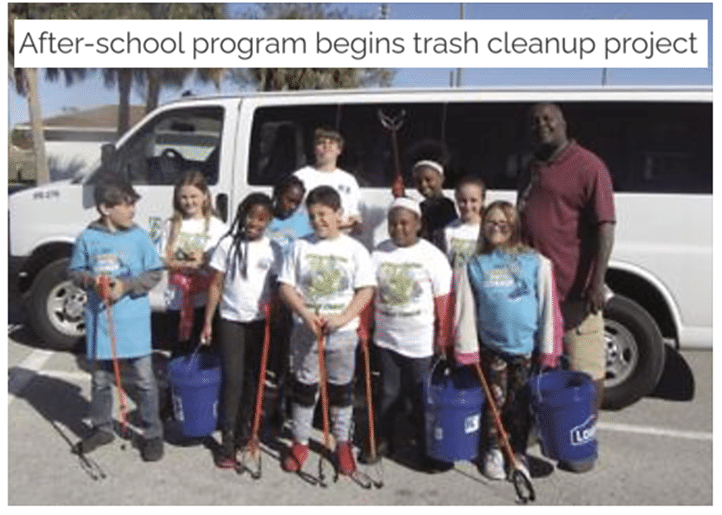
Source: Hometown News Brevard
For example, doing park cleanups or planting trees in partnership with local environmental organizations give students a chance to contribute to their community in a meaningful way while also learning about the importance of environmental protection.
At the same time, they’re developing important skills such as teamwork, leadership, and problem-solving.
Finally, such community service actions also generate more community support for your program.
Overall, your community has so many resources that can enrich your after-school program that building connections and establishing partnerships with local organizations, groups, businesses, and individuals is crucial for running a successful program.
Strengthen Your Relationship With Students
A quality after-school program has qualified staff members who understand the importance of fostering strong relationships with students.
More precisely, they should be mentors and role models to their students, communicate high expectations for their academic performance and behavior, and help them meet those expectations within the after-school program.
In fact, many studies have revealed that regular attendance of high-quality after-school programs is linked to improvements in academic performance, work habits, and social and emotional competence.
For example, one study found that students who regularly attended such programs:
…demonstrated significant gains in standardized math test scores, compared to their peers who were routinely unsupervised during afterschool hours.
In other words, the program staff should be aware that having high expectations from their students, when coupled with the proper support, can help improve their skills and build their confidence, as highlighted by the Massachusetts Afterschool Partnership (MAP):
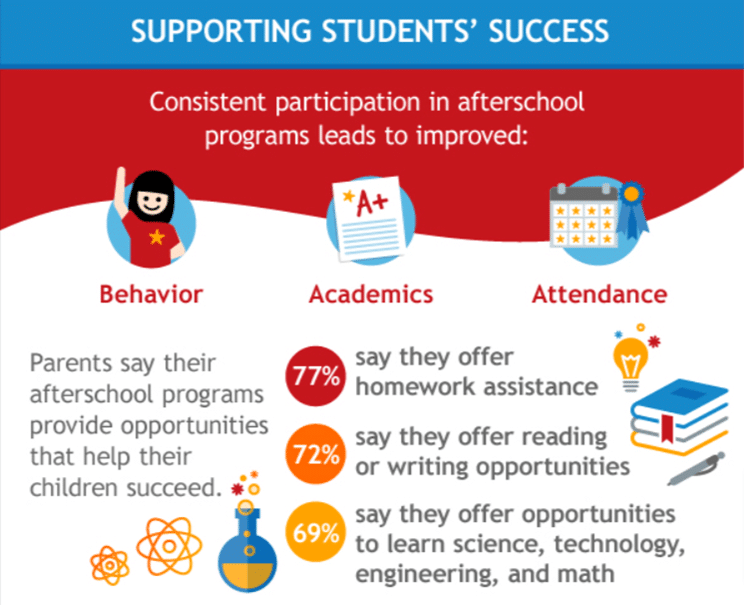
Source: MAP
However, unrealistic or unsupported expectations can have the opposite effect on children’s motivation and outcomes, which is why the program director’s hiring practices and leadership are so important.
And this is only highlighted by the fact that children attending the program already had their school day and may be tired and hungry.
Therefore, staff members should know how to create a positive and supportive environment that offers students opportunities for rest and nourishment and provides a structured routine that balances academic, enriching, and recreational activities.

Source: City of Atlanta
That way, students will get the most out of their after-school experience and improve their academic and social skills in a safe and engaging environment.
Another important aspect of strengthening relationships with your students is to ask them for input and use their suggestions when planning program activities.
Naturally, if students feel heard and see their ideas realized, that will boost their engagement and increase their participation.
For example, after parents register their children for your after-school program, you can ask them to help their kids fill out an online survey about what program activities they’re most interested in.
Based on the survey results—and your program’s goals—you and your staff can design activities that students find relevant and interesting.
This will not only increase their engagement but also strengthen the relationship with students by building trust and rapport between them and the program staff.
To sum up, strong relationships with students require a skillful program director and qualified staff who know how to communicate high expectations, help students meet those expectations, and use student input to improve their after-school program.
Keep in Touch With Parents
For their program to be successful, program directors and staff need to use formal and informal communication to share relevant information about the program with students and their families on a regular basis.
This will keep parents and guardians in the loop about the latest events and new plans, their child’s behavior and interests, as well as reassure them that your program is doing everything it can to keep their children safe and engaged.
Therefore, transparent and efficient communication with parents is vital.
Of course, today, you have many convenient digital communication methods to achieve this, such as email or text messages (SMS or social media apps like WhatsApp and Viber).

Source: LinkedIn
Therefore, staying in touch with parents has never been easier, but this still requires careful planning and organization.
For example, as a way of formal communication between your program and students’ families, they can receive a monthly newsletter and other notices by email, while other digital communication methods may be reserved for less formal interactions.
Naturally, there are many software tools that will allow you to create an e-mailing list of parents and automate the sending of newsletters, reminders, or follow-up e-mails.
Such tools are usually part of broader registration management software solutions discussed in the next section.
As for other interactions with parents, face-to-face communication remains the most effective method for successfully relaying relevant information about your program or asking for their support, such as inviting them to volunteer.
To sum up, transparent and regular communication with parents using different formal and informal, online and offline methods is crucial for ensuring the parents’ peace of mind and getting their support in running a successful after-school program.
Run Your Program With the Right Software
Last but not least, managing your program with the help of specialized software is, in today’s world, both necessary and expected.
Parents are used to the convenience of online shopping, registrations, and payment options, so they come to expect it from their after-school program as well.
The benefits they get from your program utilizing online registration software range from easy sign-up and payment process, increased access to information, personalized payment plans, and improved communication with the program staff.
In practice, this means they can register their children from any device with an internet connection and pay for the program online.

Source: New Community
From then on, they can access relevant info at any time and easily communicate with program directors and staff.
Together, these features provide parents with the convenience and accessibility they learned to expect in their busy lives.
However, it might be said that people involved in managing the day-to-day activities of after-school programs have even more to gain from such software.
For starters, when an after-school program is managed within a single software solution, this automates many administrative tasks, such as data entry, record keeping, and payment processing, which then translates into fewer errors and significantly more time for the program staff.
One such solution is our after-school program registration software, Regpack.
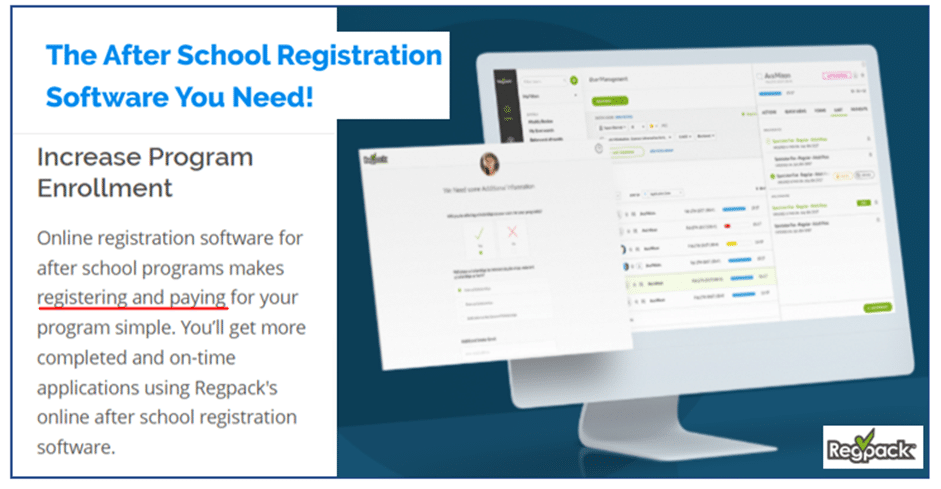
Source: Regpack
As highlighted, Regpack makes it simple for parents to register and pay for your program.
At the same time, it automates many tasks, such as creating program rosters, tracking program attendance, analyzing program data, and generating relevant reports, all of which make managing the program easier for the staff.
Program management is further facilitated by features like customized registration forms for easy data collection, automatic porting of applicant information, and automated email notifications that can be used to enhance communication with parents.
Overall, running an after-school program with the right software provides all involved—parents and students, the program director, and staff—with the convenience and efficiency needed to streamline program management and achieve program success.
Conclusion
To summarize the main takeaways, a high-quality after-school program needs a skillful leader who can build community connections, encourages staff members to strengthen their relationship with students, and stays in touch with parents while using the right tools to manage the program.
Ultimately, applying these best practices will allow you to run a successful after-school rogram that helps students improve their academic performance and social skills in a safe and enpgaging environment.


















